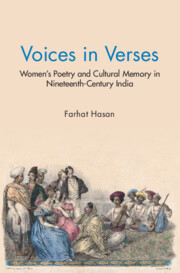
- Publisher:
- Cambridge University Press
- Online publication date:
- March 2024
- Print publication year:
- 2024
- Online ISBN:
- 9781009453066
- Subjects:
- Area Studies, South Asian History, Asian Studies, History
Online ordering is currently unavailable due to technical issues. We apologise for any delays responding to customers while we resolve this. For further updates please visit our website: https://www.cambridge.org/news-and-insights/technical-incident


This book opens up an archive of women's verses found in the extant, but overlooked, women's biographical compendia (tazkira-i zenana) written in the nineteenth century. As commemorative texts, these compendia written in Urdu draw our attention to their memories – celebrated and contested – in cultural spaces. In drawing connections between memory and literature, this study contests the commonplace assumption that the literary public sphere was markedly homosocial and gender exclusive, and argues instead that the women poets, coming from a wide variety of social groups, actively participated in shaping the norms of aesthetics and literary expression; they introduced fresh signifiers, and signifying practices to apprehend their emotions, experiences and world-views. This work suggests that the women's tazkiras performed an act of 'epistemic disobedience' contesting not only the British imperial representations of India, but also the Indo-Muslim modern reformers on issues of domesticity, conjugal companionship, and love and desire.
‘Voices in Verses takes us into the markets and palaces, brothels and salons, of nineteenth century India to hear women speak of their lives and feelings through poetry. Rare biographical compendia, known as tazkiras, are treated to a wonderfully sensitive analysis that reveals women's compositions to be at once exemplary and defiant of their literary and social worlds. An inspired and inspiring book that is a joy to read.'
Siobhan Lambert-Hurley - University of Sheffield
‘Farhat Hasan must be commended for his evocative, nuanced, and multifaceted explorations of women's Urdu and Persian verses – women from public, secluded, royal, and ordinary walks of life – as compiled in a couple of nineteenth century compendia, the tazkirat-i-zanāna. These compositions come mediated through male authors and prefaced with biographical sketches that direct and constrict meaning-making. Hasan displays his masterly historian's skills in unpacking layered striations of words, performances, textures, and gestures – the sensoria through which we may grasp their variegated fields of significations. By facilitating access to this as yet “veiled” literary archive, Hasan opens up “subjugated knowledge” to assert its insistent and salient presence in shaping literary and cultural praxis in the richly varied world of Persianate Hindustan. Voices in Verses tells of the deep and diverse histories of cultural inheritances embedded in South Asian ethos before the complicities and complexities of colonial and national confinements. This volume is a triumph of gendered reading that enriches the discipline of South Asian history.'
Anshu Malhotra - University of California
‘In Voices in Verses, Farhat Hasan reads the tazkira archive along and against the grain to recover and interpret for us the verses and biographies of Urdu women poets. A wide and rich corpus comes into view that plays with codes of veiling and unveiling and nuances emotions of joy and loss.'
Francesca Orsini - SOAS University of London
 Loading metrics...
Loading metrics...
* Views captured on Cambridge Core between #date#. This data will be updated every 24 hours.
Usage data cannot currently be displayed.